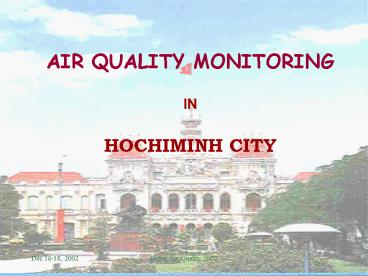AIR QUALITY MONITORING - PowerPoint PPT Presentation
1 / 15
Title:
AIR QUALITY MONITORING
Description:
... air quality in Ho Chi Minh City to City authority, policy makers and ... in Ho Chi Minh City. Dec 16-18, 2002. Better Air Quality 2002. Roadside Air Quality in HCMC ... – PowerPoint PPT presentation
Number of Views:1544
Avg rating:3.0/5.0
Title: AIR QUALITY MONITORING
1
AIR QUALITY MONITORING IN HOCHIMINH CITY
2
Background
- Area 2,093.7 km2. Population 5 million.
Average population density 2,419 pers/km2 - Industry 28,500 small-scale industries, 700
medium/large-scale industries. 10 industrial
zones 02 export processing zones - Over 2,250,000 motorcycles and 175,000 all kinds
of automobiles - Domestic solid waste 5,000 tons/day
- Hospital waste 07 tons/day collected and treated
- Domestic waste water 800,000 m3/day not treated
- ? Air quality is becoming a serious problem as a
result of the uncontrolled emissions.
3
Air Quality Monitoring System (AQMS) - Objectives
- Main objective of AQMS in HCMC is supplying
precise and reliable data on air quality in Ho
Chi Minh City to City authority, policy makers
and public. - Aimed subordinate objectives
- - Monitoring trends of air pollution over time
- - Establishing a relation between pollution
source- receptors - - Identifying what worst pollutants and how
their serious level - - Evaluating the effects of air pollution
control programs - - Understanding the exposure of population to
air pollution - - Giving database for urban planning, land use,
transportation planning, preparing environmental
strategy and policy - - Applying in air modeling.
4
Air Quality Monitoring System (AQMS) - History
- The end of 1992 The network includes four
ambient air monitoring stations (PM, SO2, NOx)
and three stations for roadside monitoring (PM,
NOx, Pb, noise). - In June 2000, the automatically air quality
monitoring system supported by UNDP DANIDA,
includes two urban background stations (monitor
PM10, SO2, NOx, CO, O3), two roadside stations
(monitor PM10, NOx, CO, O3 ), were installed. - In Nov 2002, more new five automatically air
quality monitoring stations were installed by
NORAD support, includes three urban background
stations (monitor PM10, SO2, NOx, O3), two
roadside stations (monitor PM10, NOx, CO, O3 ).
5
Air Quality Monitoring Sites in Ho Chi Minh City
6
Roadside Air Quality in HCMC
7
Roadside Air Quality in HCMC
8
Roadside Air Quality in HCMC
9
Roadside Air Quality in HCMC
10
Roadside Air Quality in HCMC
11
Ambient Air Quality in HCMC
12
? AQI as an useful tool to inform air quality
data to public
13
Web page http//www.doste.hochiminhcity.gov.vn/MO
ITRUONG/
- Monitoring data and
- Air Quality Index
- are presented on City-Web, public electronic
board
14
- Conclusion Remarks
- Result
- Dust (TSP, PM10) and CO have been the most
serious pollutants in roadside air - Concentration of pollutants have a increasing
trend basing on the urban development
(transportation, building, population), if not
performing any improvement. - Data shows lead concentrations in roadside air
reduced substantially and lower WHO standard
after using unleaded gasoline. In results, public
health gains benefit - Constrains
- - Lack of man power, professional knowledge and
experiences - - Difficulties in maintenance and repair
instruments
15
- THANK YOU
- FOR
- YOUR ATTENTION !!































